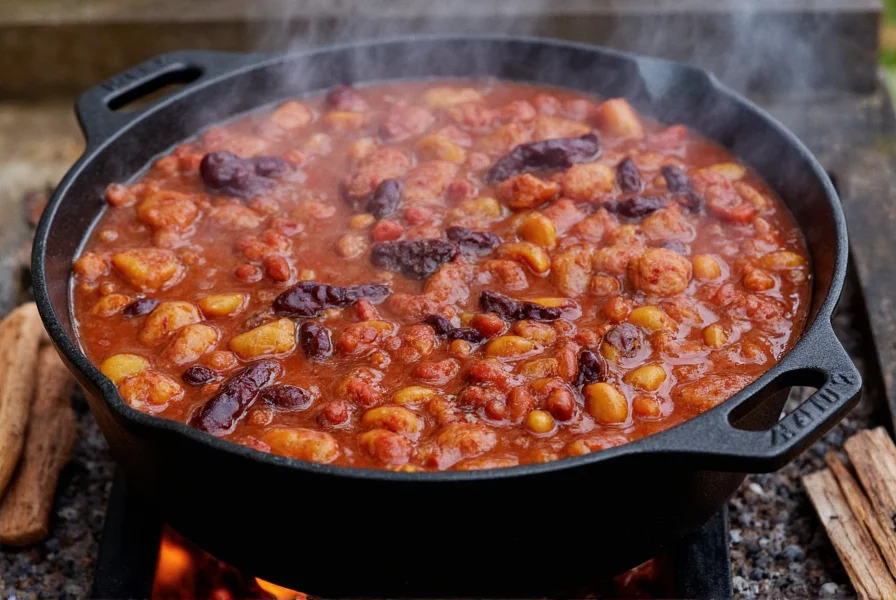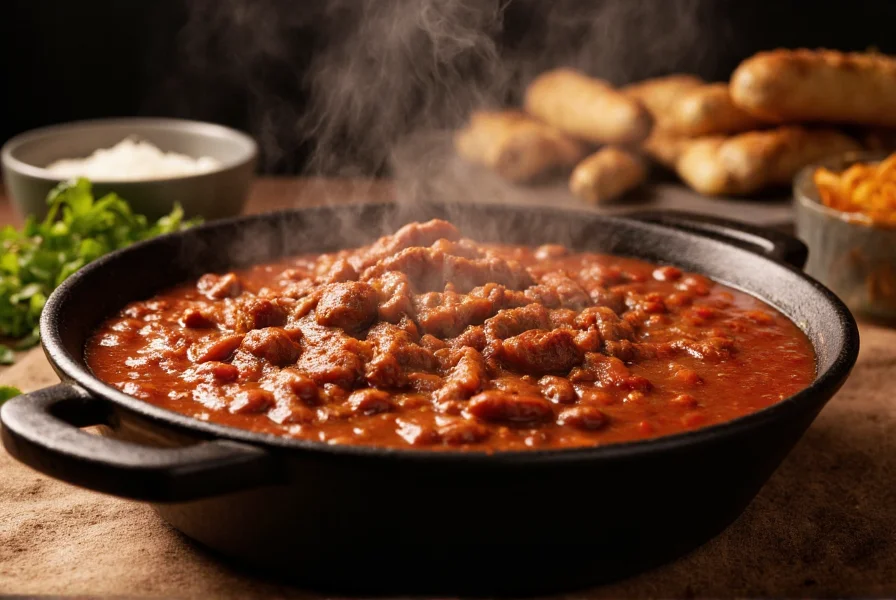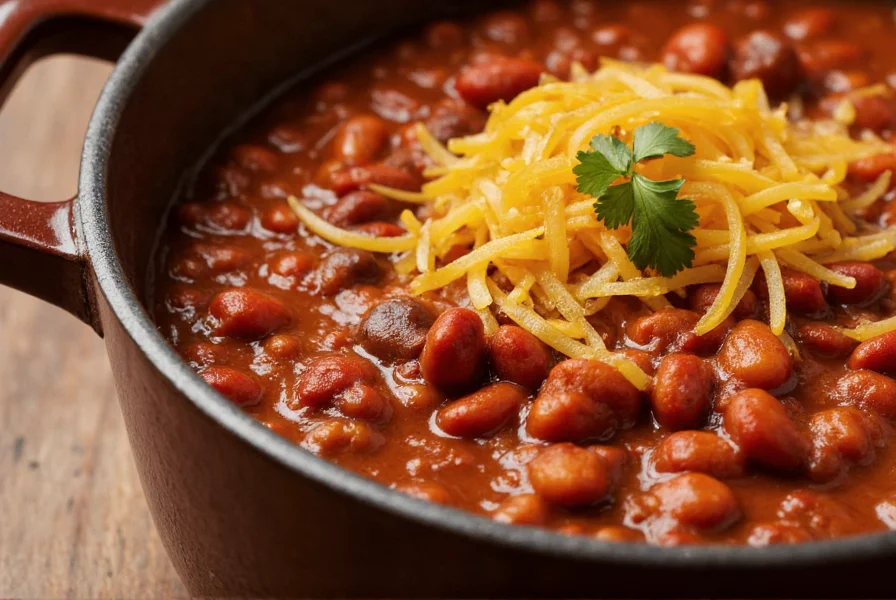When you're searching for an authentic old fashioned chili recipe, you're looking for the real deal—the kind that Texas cowboys actually ate on the trail. Forget modern versions loaded with beans and tomatoes; traditional chili con carne is a meat-forward stew built on dried chili peppers, spices, and patience.
The History Behind True Old Fashioned Chili
Understanding where traditional Texas-style chili recipe originated explains why certain ingredients are essential while others are modern additions. Chili's roots trace back to 19th century Texas, where Mexican and Tejano vaqueros (cowboys) developed a portable, shelf-stable meal using dried beef, suet, and dried chili peppers.
When Anglo cowboys adopted the dish, they substituted beef chunks for the traditional dried meat. The iconic chili stands of San Antonio in the late 1800s popularized this simple preparation, which typically contained only meat, fat, chili peppers, and spices. Beans didn't become common until the Great Depression when cooks added them as a cheap filler.

What Makes Chili "Old Fashioned"
Many recipes claim to be "old fashioned," but authentic old west chili recipe has specific characteristics:
- No beans – Traditional chili never included beans
- No tomatoes – Tomatoes are a modern addition
- Dried chili peppers – Not powder (though powder works in a pinch)
- Simple spice profile – Primarily cumin and garlic
- Long cooking time – Minimum 3-4 hours for proper flavor development
- Meat-forward – At least 75% meat by volume
Essential Ingredients for Authentic Old Fashioned Chili
The magic of authentic old fashioned chili without beans comes from quality ingredients and proper technique. Here's what you need:
| Ingredient | Traditional Form | Modern Equivalent |
|---|---|---|
| Chili Peppers | Dried ancho, guajillo, New Mexico | 2-3 tbsp pure chili powder |
| Meat | Beef chuck, round, or suet | 3 lbs cubed beef chuck |
| Spices | Whole cumin seeds, garlic cloves | 2 tbsp ground cumin, 6 garlic cloves |
| Liquid | Beef broth or water | 4 cups low-sodium beef broth |
Step-by-Step Old Fashioned Chili Recipe
This slow cooked beef chili recipe follows historical preparation methods while adapting for modern kitchens:
- Prepare the chili peppers – Toast dried peppers in a dry skillet until fragrant, then soak in hot water for 20 minutes. Blend into smooth paste.
- Sear the meat – Cut 3 lbs beef chuck into 1-inch cubes. Brown thoroughly in a cast-iron pot with 2 tbsp beef tallow or lard.
- Add spices – Stir in 2 tbsp ground cumin and 6 minced garlic cloves, cooking for 2 minutes until fragrant.
- Combine ingredients – Add the chili pepper puree and 4 cups beef broth. Bring to a gentle simmer.
- Slow cook – Cover and simmer on low heat for 3-4 hours, stirring occasionally, until meat is fork-tender and flavors are fully integrated.
- Skim fat – Remove excess fat from the surface before serving.

Traditional Cooking Techniques
The how to make chili like cowboys method involves specific techniques that modern recipes often skip:
- Use of animal fat – Traditional recipes used beef suet or tallow, not vegetable oil
- Chili pepper preparation – Dried peppers were toasted and soaked, not used as powder
- Cast iron cooking – Essential for even heat distribution over open flames
- Low and slow – Minimum 3-hour simmer to develop deep flavors
- No stirring frenzy – Traditional cooks stirred minimally to prevent breaking down the meat
Serving Authentic Old Fashioned Chili
How you serve your historical chili con carne recipe matters as much as how you make it:
- Serve in wide, shallow bowls to allow heat to escape properly
- Offer traditional accompaniments: saltine crackers, shredded cheddar, and raw white onions
- Never serve with rice—this is a modern addition not part of authentic Texas chili
- For true historical accuracy, serve without any cheese (added later)
Common Mistakes to Avoid
Even experienced cooks make these errors when attempting an old fashioned chili recipe:
- Using chili powder exclusively – While convenient, pure chili powder lacks the complexity of rehydrated dried peppers
- Adding tomatoes – Tomatoes weren't part of traditional recipes and change the flavor profile
- Overcrowding the pot – Prevents proper browning of meat, essential for flavor development
- Rushing the cooking process – Authentic chili needs hours to develop proper texture and flavor
- Using lean meat – Traditional recipes relied on fatty cuts for richness and moisture
Why This Recipe Stands the Test of Time
The enduring appeal of authentic old fashioned chili without beans lies in its simplicity and depth of flavor. Unlike modern versions loaded with ingredients, traditional chili showcases the art of building complex flavors from few components through proper technique. The long simmering time allows collagen in the meat to break down into gelatin, creating a rich, unctuous texture that modern quick-cook methods can't replicate.
When made properly, this traditional texas style chili recipe delivers a deeply savory, slightly spicy, and complexly flavored dish that connects us to culinary history while satisfying modern palates. The absence of beans and tomatoes lets the pure essence of chili peppers and beef shine through in a way that contemporary adaptations often obscure.
Frequently Asked Questions
Why don't traditional old fashioned chili recipes include beans?
Beans weren't part of authentic Texas chili recipes. They were added during the Great Depression as a cheap filler. Traditional chili con carne from the 19th century contained only meat, fat, chili peppers, and spices.
Can I use chili powder instead of dried chili peppers?
Yes, though it's not completely traditional. For authentic flavor, use 2-3 tablespoons of pure chili powder (without additives) as a substitute for rehydrated dried peppers. Ancho chili powder provides the best flavor profile for old fashioned chili.
How long should I simmer old fashioned chili?
Authentic old fashioned chili requires a minimum of 3-4 hours of gentle simmering. This extended cooking time allows the meat to become fork-tender, the flavors to fully integrate, and the natural gelatin from the meat to create a rich, unctuous texture.
What's the difference between chili con carne and regular chili?
Chili con carne literally means 'chili with meat' in Spanish. Authentic chili con carne refers specifically to the traditional Texas-style meat stew without beans. 'Regular chili' often refers to modern adaptations that include beans, tomatoes, and other ingredients not found in historical recipes.











 浙公网安备
33010002000092号
浙公网安备
33010002000092号 浙B2-20120091-4
浙B2-20120091-4